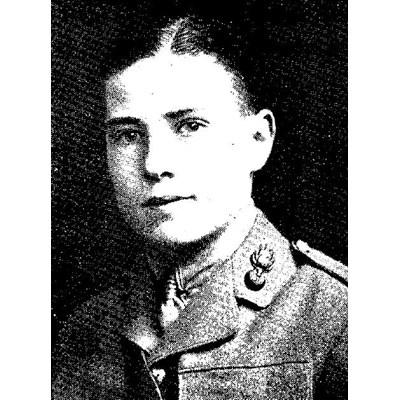Nimmo, Stuart Henry ( - 1918)

Captain, 8th Bn. Royal Scots Fusiliers
Buried at Doiran Memorial
Commemorated at Hillhead High School
Captain Stuart Nimmo, elder son of Mr. and Mrs. Charles Nimmo, The Crescent, W. Croydon, was born at Dunoon in 1897. He was educated at Ardrossan Academy and Hillhead High School. At the latter he stayed seven years, and few pupils entered more whole-heartedly into the life of the School or remained more constant in his affection for it. He was by no means a student, as all his interests lay in the direction of games and action generally. He was noted for his cheerfulness and pluck, and his bright and happy nature will always be gratefully remembered by his schoolfellows. He was intensely fond of music, and the band of the Cadet Corps owed much to his enthusiasm and skill.
On leaving School he entered the office of Messrs. Arbuckle, Smith & Co., shippers. The martial spirit was strong in Stuart, and when war began he tried to enlist, but a kindly old colonel turned him down with the words, "You look more like a schoolboy than a soldier." But on coming of age he applied again, and this time was granted a commission in the 9th R.S.F.
In September, 1916, he left for Salonica. There he experienced to the full all the depressing conditions of that malaria-infected region. But nothing would damp his high spirits. He was a singularly devoted son and brother, and his letters home were simply bubbling over with humour and cheeriness. Just before the big advance on Bulgaria he wrote, "If you don't hear from me for a time don't fret. I am absolutely full of life-and work."
He was eagerly looking forward to leave, which was long overdue, but a series of untoward circumstances kept it back. Then came the final act in the Balkan drama, and not an officer could be spared. Stuart, moreover, was adjutant to his battalion, and simply could not get away.
In the attack on the enemy's strong position west of Lake Doiran the battalion speedily reached its objective, but there came under heavy fire, and Stuart was killed instantaneously, 19th September, 1918.
One of his fellow-officers writes, "I cannot express to you my sorrow and the sorrow of the whole battalion at the loss of such a good, gentle, yet most efficient officer."
Another says, "He was deservedly one of the most popular of officers both with his fellow-officers and with the men. During the two months before his death, when he held the position of adjutant, he showed that, in addition to his qualities of being one of the best of good fellows and as straight as a die, he had ability, common sense, and tact in a surprising degree in one so young."




